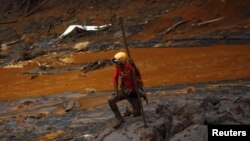Mud and wastewater from burst dams at a Brazilian iron ore mine cut off drinking water and raised health and environmental concerns in cities more than 300 km (186 miles) downstream on Monday, amid increasingly dire search efforts in a village devastated by the mudslides.
One of Brazil's worst mining disasters in recent memory left 25 people missing. Officials have confirmed two deaths since Thursday's tragedy and are working to identify two more corpses recovered on Sunday.
Exhausted firefighters waded through waist-deep mud as thick as wet concrete among the tangled remains of Bento Rodrigues, a 600-person village that stood in the shadow of the broken dams in an area about a six-hour car ride north of Rio de Janeiro.
Intense flooding swept through towns as far as 100 km (62 miles) downstream after the dams burst at two reservoirs holding mining waste. Four days later the mud and mining waste still was running past the well-populated banks of the Rio Doce river.
Governador Valadares, a city of 280,000, has cut off its municipal water supply for 24 hours so far and will keep testing the water until the mud passes, officials said on Monday.
State health officials are checking the toxicity of the waters and warned residents who came in contact with the mud to throw out their clothing.
Biologists warn that the environmental impact may be permanent, devastating local fisheries and farms.
The tragedy has galvanized government officials, environmentalists and outraged residents to call for tighter regulation of the powerful mining industry.
Residents and officials also have criticized what they say has been lax communication by mine operator Samarco, a joint venture between the world's largest mining company, BHP Billiton Ltd., and the biggest iron ore miner, Vale SA.
Samarco has said it is dedicated to mitigating the environmental and human impact of the disaster, paying for accommodations and relocation of affected residents. But families complain that the company has given few answers about how long the displacements might last or how they might eventually repair or replace damaged homes.
Hope is wearing thin for Marcelo Jose Felicio, a contractor at the mine with a tattoo of his mother, who went missing from Bento Rodrigues when the village was consumed by mudslides.
"No one tells me anything," he said. "I don't know if she is alive. I don't even know if she is on the list of the missing. I've passed around photos in case someone finds her."
On Sunday, BHP said Andrew Mackenzie, chief executive officer of the Australian company, was flying to Brazil to assess the situation. In a statement, the company said it was providing Samarco "with all the assistance necessary."
Vale, a Brazilian company with a long history of operations in Minas Gerais, has referred all queries about the incident to Samarco.





